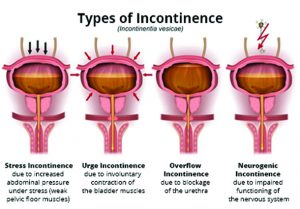By Ronald W. DeMasi, M.D.
 When illness strikes, it often blindsides its victims with acute symptoms that disrupt their lives. For individuals with incontinence issues, these changes are incredibly challenging to live with on a day-to-day basis. Our gastrointestinal tracts are intricately detailed to detoxify our bodies, but when they are damaged or diseased the detoxification methods become out of our control.
When illness strikes, it often blindsides its victims with acute symptoms that disrupt their lives. For individuals with incontinence issues, these changes are incredibly challenging to live with on a day-to-day basis. Our gastrointestinal tracts are intricately detailed to detoxify our bodies, but when they are damaged or diseased the detoxification methods become out of our control.
What causes incontinence?
Fecal incontinence affects 18 million people in the U.S. alone. This subject is a delicate one because no one likes to discuss bowel movements or rectal health, but because it affects so many people, it’s critical for those suffering or future sufferers to understand why this happens and what your options are to correct the issue.
Frequent diarrhea or constipation like those associated with IBS (irritable bowel syndrome) is very often the initial symptom of future incontinence. When the muscle or nerves in the rectum are damaged or diseased, a lack of flexibility and space develops in the intestines, and the loss of control begins to take place. Other causes of GI incontinence are giving birth, aging, dementia, tumors, cancer, and overuse of laxatives.
The disorder varies from light, infrequent, bouts of uncontrolled fecal release to a total loss of control. Unfortunately, many people believe that an adult diaper is the only answer to their dilemma.
For many, the embarrassment keeps them from getting the appropriate treatment, as they suffer in silence thinking there is no cure. However, there is an advanced technology that can detect and find the precise reason that a person may be having fecal incontinence.
Manometry
The procedure is manometry, and the best news is that it can be done right in the privacy of your gastroenterologist’s office. Your intestinal tract runs about 30 feet from the moment you take in food
until you pass it back out. The colon manometry test studies how your food is digested and how long it takes for the nerves and muscles to move it completely through your system. A tiny catheter is guided and placed inside the rectum; during the test, the catheter measures the pressure and contractions of the anal sphincter muscles.
The test results will pinpoint what is causing your incontinence and will allow the physician to prescribe the appropriate treatment or medications for your particular disorder.
Manometry Changes Lives
The process is fairly simple, but while it’s still an inconvenience for many to consider, the short time it takes to finally get the answers you need is incomparable. The patients that undergo this procedure cannot say enough good things about how it’s changed their lives and how they wish they’d had it done at the onset of their symptoms.
With three locations to serve you, DeMasi Digestive Health, the areas leading gastroenterology practice, focuses on the treatment of the gastrointestinal or “GI” tract. They diagnose and treat the diseases of the digestive organs, including stomach, esophagus, intestines, pancreas, liver, and gallbladder.
Their patients that have suffered from various forms of fecal incontinence are the first to explain how invaluable this procedure is, as it’s given them their lives back with normalcy and the ability to leave their homes without the worry of incontinence.
In the past, fecal incontinence was difficult to diagnose and manage. However, the Mayo Clinic designed state-of-the-art manometry equipment which can be used in an outpatient office setting. DeMasi Digestive Health is using this technology to diagnose and treat patients with fecal incontinence.
If you or someone you know could benefit from manometry, or if you have other GI conditions, please call Demasi Digestive Health today at (941) 584-6272.
Ronald DeMasi, M.D. M.S.P.H,
Board Certified Gastroenterologist
After completing his training at Yale University’s St. Raphael Hospital Progam in 1998, Dr. Ronald DeMasi returned home to Venice, FL to practice with his father, Clem DeMasi, M.D. In 2009, he established DeMasi Digestive Health with a vision to build on the foundation that began with his father: serving patients with the excellent care and the compassion they deserve.
DeMasi Digestive Health is a comprehensive gastroenterology practice that focuses on the treatment of the gastrointestinal or “GI” tract diseases and disorders. They diagnose and treat the conditions of the digestive organs, including stomach, esophagus, intestines, pancreas, liver, and gallbladder.
If you or someone you know has GI ailments or other related symptoms, please contact DeMasi Digestive Health at (941) 584-6272, or visit demasidigestivehealth.com
Venice
1370 E. Venice Ave. Suite, 210
Venice, FL 34285
North Port
14575 Tamiami Trail
North Port, FL 34287
Englewood
250 W. Dearborn Street
Englewood, FL 34223







